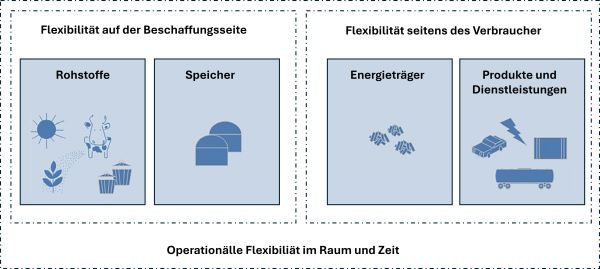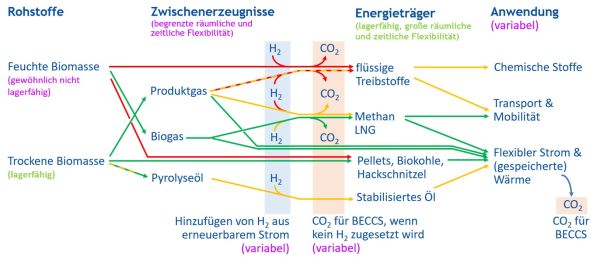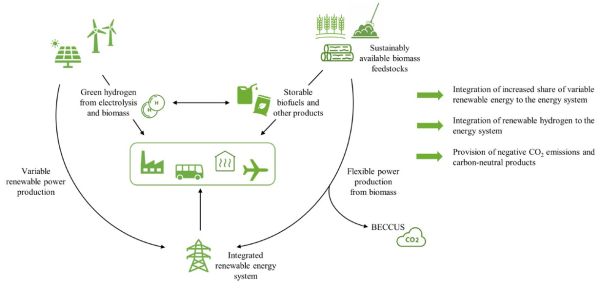IEA Bioenergy Task 44: Flexible Bioenergy and System Integration (Working Period 2022 - 2024)
Short Description
The ongoing and rapid expansion of wind and photovoltaic power generation is an undisputed principle of the energy transition. However, wind and solar power are fluctuating energy sources. To solve the dynamic puzzle between supply and consumption in a sustainable way, a flexibilization of our energy system is urgently needed. In addition to storage technologies and demand management, the bio-economy provides numerous other flexibilization options, for short-term to seasonal.
The rapid expansion of wind and photovoltaic power is a key component of the energy transition. As these are volatile energy sources, the energy system needs to be made more flexible. In addition to storage technologies and demand management, the bio-economy offers numerous flexibilization options for electricity, heat and bio-based materials.
Task 44 supports the development of flexible bioenergy solutions for a low-carbon energy system. The aim is to improve the understanding of the possibilities and their potential as well as the status of flexible bioenergy and to identify obstacles and future development needs in the context of the entire energy system (electricity, heat and transport). This is pursued through three main objectives:
1. To identify and evaluate viable flexible bioenergy concepts for supporting low-carbon energy
systems
2. To identify system requirements for flexible bioenergy concepts
3. To accelerate the implementation of flexible bioenergy concepts
To achieve this, the following results were achieved in the 2022-2024 triennium:
- Ten new best practice examples on flexible bioenergy were published, which also included an Austrian flagship project Waste2Value.
- A two-part report analysed developments in the implementation of flexible bioenergy in 14 countries and the role of policy in promoting flexible bioenergy with a focus on national and international framework conditions, synergies and barriers.
Implementation of flexible bioenergy in different countries (05/2024)
Expectations on flexible bioenergy in different countries (02/2025)
These two documents are supplemented by a summary report.
Flexible bioenergy policies in different countries – Summary report (03/2025) - The definition of synergies with green hydrogen strategies and BECCS/U approaches has been summarized in the following report: BECCUS and flexible bioenergy – finding the balance (08/2023)
- In a new edition of the report "Technologies for Flexible Bioenergy", the topics of monitoring the development of flexible bioenergy concepts and identifying the requirements for the energy system were addressed. The report was finalized at the beginning of the new working period 2025-2027 after a detailed review by the entire consortium.
- A report on "The Value of Flexible Bioenergy", in which electricity markets in selected European countries were assessed, will be published at the beginning of the new 2025-2027 working period after a detailed review.
Together, the Austrian representative consortium has endeavored to promote Austrian flagship projects and disseminate them internationally, as well as to involve the Austrian bioenergy sector accordingly and disseminate the knowledge gained in the TASK within Austria. This was achieved in particular through the cross-task IEA-Cross-TCP-Workshop "Pathways to a flexible, cross-sectoral energy supply with a special focus on the provision of flexibility via the heating sector" as part of the Central European Biomass Conference 2023 in Graz and through the publication of an Austrian best practice example Waste2Value.
Project Images
Terms of use: The pictures listed underneath the header “Project Pictures” originate from the projects in the frame of the programmes City of Tomorrow, Building of Tomorrow and the IEA Research Cooperation. They may be used credited for non-commercial purposes under the Creative Commons License Attribution-NonCommercial (CC BY-NC).
Participants
Finland (Task leader), Germany, Australia, Austria, Netherlands, Sweden, Switzerland, USA
Contact Address
BEST - Bioenergy and Sustainable Technologies GmbH
Markus Gölles
Inffeldgasse 21b
A-8010 Graz
E-Mail: markus.goelles@best-research.eu
Fabian Schipfer
Internationales Institut für Angewandte Systemanalyse (IIASA)
Schlossplatz 1, Laxenburg
E-Mail: schipfer@iiasa.ac.at
Web: iiasa.ac.at



